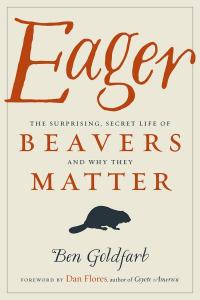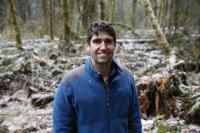Ben Goldfarb: Secret Life of Beavers
For this column, NASW book editor Lynne Lamberg asks NASW authors to tell how they came up with the idea for their book, developed a proposal, found an agent and publisher, funded and conducted research, and put the book together. She also asks what they wish they had known before they began working on their book, what they might do differently the next time, and what tips they can offer aspiring authors. She then edits the A part of that Q&A to produce the author reports you see here.
Publication of NASW members’ reports in Advance Copy does not constitute NASW’s endorsement of their books. NASW welcomes your comments, and hopes this column stimulates productive discussions.
EAGER:
THE SURPRISING, SECRET LIFE OF BEAVERS
AND WHY THEY MATTER
Ben Goldfarb
Chelsea Green Publishing, June 27, 2018, $24.95
ISBN-10: 160358739X; ISBN-13: 978-1603587396
Goldfarb reports:
My book journey began in 2015, when I wrote an article about beaver restoration in Washington State for the magazine High Country News. Although I’d always admired beavers, I’d never quite appreciated their role in shaping North America’s ecological and geological history until digging into that story.
Some months later, an editor at Chelsea Green Publishing stumbled upon the article and asked if I’d consider expanding it into a book. I developed a forty-page proposal. After a couple rounds of contractual negotiations, the project was off and running.
Eager’s format is essentially a series of self-contained but connected chapters about how beavers benefit ecosystems and human activities. In Nevada, the story is how beavers store water for agriculture; in Oregon, it’s how beavers create habitat for endangered salmon; in Massachusetts, it’s how humans can coexist with suburban beaver populations; and so on. This meant a lot of field reporting: I spent four months driving around the country meeting scientists, ranchers, trappers, and conservationists.
The first third of my advance funded these travels, but I was definitely on a tight budget. My itinerary featured lots of camping on Forest Service land and couch-surfing with strangers, both fun and memorable ways to get a free night’s sleep. My wife and I also snuck in a trip to Scotland, where beavers have been reintroduced after a 400-year absence.My advice to other writers is perhaps obvious, but bears emphasizing: Libraries are your friend. In Eager, I seek to envision how wet, lush, and biodiverse a fully beavered North America must have been before the arrival of the fur trade. Reconstructing environmental history requires a wide array of sources, from trappers’ journals to railroad surveys to Native oral histories.
Fortunately, I lived in New Haven, Conn., during my research, which gave me access to Yale’s Beinecke Library, one of the world’s best collections of material from the American West. I spent many days in the Beinecke, but it easily could have been many months. So: find a fantastic library, and don’t shortchange your time there.
Contact info:
- Ben Goldfarb, 914-960-2066, ben.a.goldfarb@gmail.com, www.bengoldfarb.com, @ben_a_goldfarb
- Book website: https://www.chelseagreen.com/product/eager/
- Publicist: Christina Butt, 802-295-6300 x127, CButt@chelseagreen.com
NASW members: will your book be published soon? Take advantage of this opportunity for shameless self-promotion. Submit your report for Advance Copy.
Tell your fellow NASW members how you came up with the idea for your book, developed a proposal, found an agent and publisher, funded and conducted research, and put the book together. Include what you wish you had known before you began working on your book, or had done differently.
See https://www.nasw.org/advance-copy-submission-guidelines.
Thinking of writing a book? If you are a NASW member, you may access a list of more than 150 books and online resources to help you craft your book proposal, find an agent and funding sources, negotiate your contract, learn about self-publishing, publicize and market your book, and more at https://www.nasw.org/article/write-book.
Send book info and questions about book publishing to Lynne Lamberg, NASW book editor, llamberg@nasw.org.





